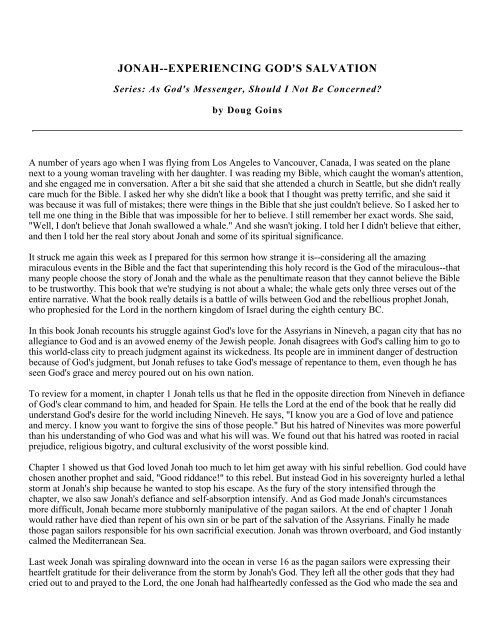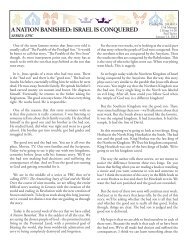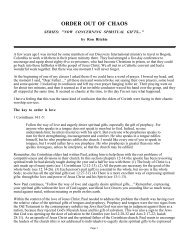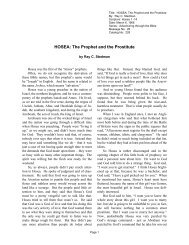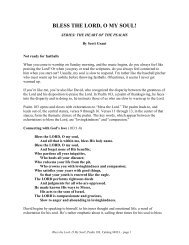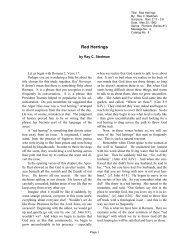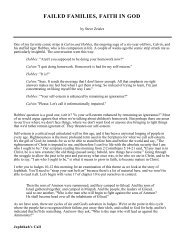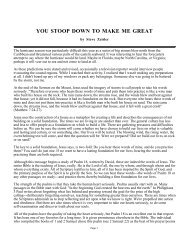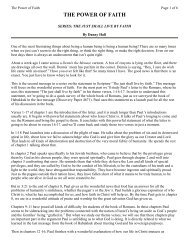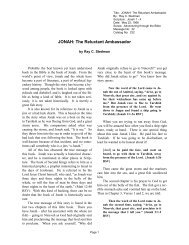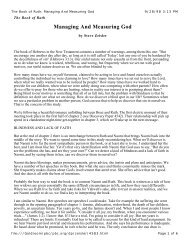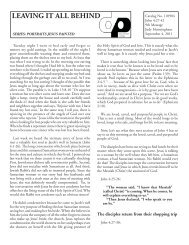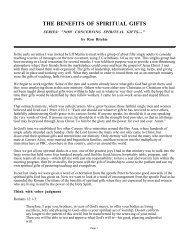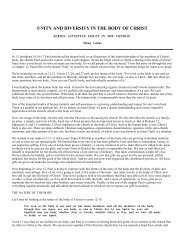jonah--experiencing god's salvation - Peninsula Bible Church
jonah--experiencing god's salvation - Peninsula Bible Church
jonah--experiencing god's salvation - Peninsula Bible Church
You also want an ePaper? Increase the reach of your titles
YUMPU automatically turns print PDFs into web optimized ePapers that Google loves.
the dry land (verse 9). These Phoenician sailors began to come into a relationship of faith with God.The servant of <strong>salvation</strong>God was using Jonah in spite of himself to bring about <strong>salvation</strong>. Salvation is the central theme of this entire book.In chapter 1 <strong>salvation</strong> came to the Phoenician sailors. In chapter 3 next week we'll see <strong>salvation</strong> come to theAssyrians in the city of Nineveh. But this week the story focuses on one man, Jonah, and how <strong>salvation</strong> comes tohim. It is <strong>salvation</strong> that Jonah does not deserve because he is so angry, resistant, and disobedient, and yet God islovingly gracious. Jonah is going to drown, and he can't save himself. But God in mercy reaches out to rescue himfrom death.This week we're going to see Jonah barely begin to agree with God's heart of <strong>salvation</strong>. Remember, in chapter 4verse 2 Jonah says to God, "...I knew that thou art a gracious God and merciful, slow to anger, and abounding insteadfast love, and repentest of evil." Now in chapter 1 verse 17 and chapter 2 verse 1 and then verse 10 (passingover the prayer in verses 2-9), we see the amazing surprise of <strong>salvation</strong> in the life of Jonah as God expresses hismajesty, power, and absolute sovereignty through this miraculous event.And the LORD appointed a great fish to swallow up Jonah; and Jonah was in the belly of thefish three days and three nights. Then Jonah prayed to the Lord his God from the belly of thefish...And the LORD spoke to the fish, and it vomited out Jonah upon the dry land.The subject of these three verses is certainly not the fish, and not even Jonah, but God. The point that Jonah wantsto make throughout this entire book and especially here is that God intervenes miraculously and powerfully tosave him (and we'll see next week that God reconscripts him to go back to Nineveh to fulfill the original call). Hechooses a specific "great fish," to be his servant and appoints it officially to serve his purpose. We cannotoverestimate God's sovereignty in finding the great fish and sending it off on this particular errand of rescue. Youhave perhaps heard stories about sperm whales that could swallow a sailor and keep him alive for a few hoursbefore he was rescued. But for Jonah to survive going clear to the bottom of the ocean, to be swallowed whole bythe fish, to survive with consciousness for three days in the belly of the fish and create the beautiful prayer thatwe're going to read, and finally for God to command the fish to vomit Jonah out on the shore, is a trulymiraculous event.God is at work to rescue his prophet with a purpose--not just to save his life or to make him thankful to God, butultimately because he wants to save both Jonah and the city of Nineveh for eternity. There is a saving purpose inall of these miraculous events. In Jonah's experience in the four chapters of this book God has already used astorm and a fish, and we're going to see in the chapters ahead of us that he will use a plant, a worm, and ascorching east wind all to accomplish his saving purpose in Jonah's life. As the omnipotent God of the universe,he breaks into his ordered creation and literally moves heaven and earth to save Jonah. Through Jonah's preachinghe is going to save Nineveh; and then through Jonah's writing of this account he wants to save the Jewish peoplefrom their narrowness, self-righteousness, and sense of religious superiority. He wants them to understand theSavior God of the world. Finally, God performs all these miracles even for our benefit so that we can understandhim and our relationship with him more fully.Chapter 2 verse 1 says, "Then Jonah prayed to the LORD his God from the belly of the fish...." In chapter 1 Jonahran away from God. Now in chapter 2 he is running back to God through prayer. The prayer is a beautiful song of<strong>salvation</strong>, a great expression of worship and praise. I suggested last week that in quoting from Exodus 34 of thePentateuch (in Jonah 4:2), Jonah knew his <strong>Bible</strong>. This prayer confirms the depth of his <strong>Bible</strong> knowledge, becausein the three dark days inside the fish he constructs this beautiful song of <strong>salvation</strong> out of psalms that he hasmemorized. Every line of this psalm echoes the hymn book of the Jewish people. He either quotes directly phraseby phrase or paraphrases the psalms. Let's read the introductory summary of his song of <strong>salvation</strong> in verses 2-3:I called to the LORD, out of my distress,and he answered me;
out of the belly of Sheol I cried,and thou didst hear my voice.Inherent in this introductory verse and the details that follow is a much greater emphasis on God's activity than onJonah's circumstances. Jonah is dying and God mercifully rescues him from death.Jonah knows he is as good as dead when he is thrown over the side of the ship. He describes the experience ofdeath by drowning and all that goes with that as distress, a word that means excruciating agony. He knows that heis headed for the belly of Sheol, the place of death, the underworld--hell itself.Splashing into the icy cold ocean water shocks him, and he is confronted physically, emotionally, psychologically,and spiritually. When we are confronted by God's exposure of some problem in our lives that we have brought onourselves, one of the things this song teaches us is to thank him for loving us enough to do whatever is necessaryto make us face what we have been doing. There is a measure of relief when things are brought to a crisis point,when we can no longer avoid what we know in our heart of hearts to be true. I find it is like those times in myrelationship with my wife, Candy, when conflict is finally flushed out in the open. Then I can see things as theyreally are and do something about my responsibility for the circumstances. Over and over again God causescircumstances in our lives that expose us to what we are doing in our rebellion against his will for us.For Jonah that does not mean an immediate release from the pain and pressure. He describes vividly the terror ofdrowning, not just the physical sensations but also what is going on spiritually in this process of spiralingdownward to the bottom of the sea. He says in verses 3-6a:For thou didst cast me into the deep,into the heart of the seas,and the flood was round about me;all thy waves and thy billowspassed over me.Then I said, 'I am cast outfrom thy presence;how shall I again lookupon thy holy temple?'The waters closed in over me,the deep was round about me;weeds were wrapped about my headat the roots of the mountains.I went down to the landwhose bars closed upon me forever...Jews were never seafarers and as a people were afraid of the ocean. For them death by drowning was the worstway to die. Their enemies often would execute them by drowning just to add that final touch of terror to theexperience of death. Jonah's prayer describes the physical agony of being helpless against the currents swirlingaround him and the waves crashing upon him. Then he describes that downward descent as he realizes the depthsof the oceans are closing in on him and there is no way to get back to the surface. In verse 5 the first phraseliterally speaks of the terror of having water enter his throat and seaweed tangle itself around his head. He finallysays he hits the bottom. We don't know how deep the ocean was there, but just imagine the terror of feeling yourfeet hit the bottom and knowing there is no way back up!At that point, through the sensations of the icy waters closing over Jonah as he fights like crazy against them, Godphysically breaks through Jonah's stubborn resolve to die. All of a sudden he realizes that he doesn't want to die,even though in a sense he drove those sailors to execute him. That is part of his spiritual agony.
In the opening phrase of verse 3 Jonah says to the Lord:"...thou didst cast me into the deep,into the heart of the sea."Jonah realizes that God is responsible for all of these consequences; God sent the storm and even resisted thewell-intentioned efforts of the pagan sailors to save his life. He is sovereignly at work. As Jonah is sinking underthe ocean he realizes that God has been saying, "All right, Jonah, you can have exactly what you want." In verse 4Jonah says:"I have been cast out from thy presence;how shall I again lookupon thy holy temple?"Finally he despairs. He will never again know his Savior God. His life is slipping away. Twice in his prayer itflashes through his mind that the temple represents his place in the family of God, and he will never see it again.He is a man who is running away from God, and so God says, "Okay, if you want escape, this will be theultimate escape." In the middle phrase of verse 6 Jonah talks about going down to the underworld where the barsare shut behind him forever. Jonah knows that when he dies he is going to hell, which is eternal separation fromhis Father God, and he is scared. That is his last memory. There is no way of escape from that consequence.Physically and spiritually it is getting darker and darker for Jonah; life is starting to ebb away.Before we move on to the good news of Jonah's <strong>salvation</strong> in verse 6, we need to stop and identify a bit with theprophet's despair in the depth of the sea, so we do not miss what his psalm has to teach us about the treasures ofthose depths. In our own experience God tracks us down, stops us in our escape from obedience, and thenconfronts us with what we are doing. He allows us to go through a time of death to our own willfulness. As wepray in that situation, we are aware of the hopelessness of changing either ourselves or the circumstances that wehave brought on ourselves. This moment of hopelessness puts us through a death to self-effort, and in a goodsense we give up. There is nothing we can do; we hit rock bottom. When that happens, our surrender to the Lord,to his mercy and his grace, becomes more than words. That is when resurrection can take place.When Jonah gives up any hope of surviving, when he can't sink any lower, God intervenes and saves him. Verses6b-7:...yet thou didst bring up my life from the Pit,O LORD my God.When my soul fainted within me,I remembered the LORD;and my prayer came to thee,into thy holy temple.At the last minute Jonah calls out for help, and in that instant he receives the mercy from the Lord that he had beenunwilling to take to the residents of Nineveh. Up to this point Jonah has desired death more than obedience toGod. But now, even as he begins to lose consciousness, he realizes that fellowship with God is more importantthan physical life, and that is the moment that God sends the fish.I remember the story from a comparative religion class I took in college about a young man who went to Buddhato ask how to find God. Buddha took him down to a river, and the young man thought Buddha was going toperform some sort of ritual cleansing. But instead Buddha held his head under water until he began to thrasharound and fight to get back up. When Buddha finally let him up, he asked the young man, "What were youthinking about when I held your head under the water?" He responded, as you can imagine, "Air!" Buddha said,"When you want God as much as you wanted air, then you will find him."
That is a compelling story, but it is not about the God of the <strong>Bible</strong> and the God of Jonah's experience. The truth isthat God finds us, whether we are aware of it or not. Because he confronts us, we then turn to him. God brings usto a place where we have to admit that we have no other hope but him; there is no possibility of making it throughthe crisis that has resulted from our own sin unless he intervenes. That is because before God resurrects us fromthe grave that we have carefully dug for ourselves he wants us to deal with the death that comes from sin. ("Thewages of sin is death," says Paul in Romans 6:23.) He wants us to understand our sin-sickness before he will healus and provide the gift of eternal life.The song ends in verses 8 and 9 with Jonah's expression of praise and worship:Those who pay regard to vain idolsforsake their true loyalty.But I with the voice of thanksgivingwill sacrifice to thee;what I have vowed I will pay.Deliverance belongs to the LORD!Interpreters disagree on whom Jonah is talking about in verse 8 because it is a difficult construction. There areonly five words in the sentence in Hebrew. It's hard to tell whether the focus is on the Jewish people, who perhapsare tempted to idolatry; or Jonah himself and his pride, for there is something idolatrous in his running away; or,most likely, the Phoenicians who throw him into the ocean and the Assyrians he is called to minister to. He issaying of those people that they cling to worthless idols, but eventually they will abandon their loyalty to them.The idols will prove themselves untrustworthy and impotent.Verse 9 says, "But I..." which is a strong note of contrast. His allegiance, loyalty, and love are now focused on theGod of the universe. Some people have thought that perhaps Jonah is bargaining with God here: "If I get out ofhere I'm going to serve you, praise you, thank you--whatever you want." But this is a declarative statement; he isdeclaring that he has already been saved by God. It is an honest expression both of his understanding of how Goddelivered him personally and of his worship of God just as the Phoenician sailors worshiped God with their wholehearts out of gratitude.The tragic irony is that when God extends the same <strong>salvation</strong> to the Assyrians in Nineveh, Jonah will become veryangry. And when we look at verses 8 and 9 together we see a bit of self-righteousness in Jonah: "You saved me,but I don't embrace idolatry as those people do." But it is a gradual process of <strong>salvation</strong> that is going on. Godwants honesty, and he gets it from Jonah. And God understands the ambivalence in Jonah and can deal with thatparadox.Let me suggest several practical and personal truths we can derive from Jonah's surprising <strong>salvation</strong> by God'sintervention through the whale and from this song of <strong>salvation</strong> that Jonah composed while he was still in the bellyof the whale. The first one is that we must learn how to pray in the midst of failure, the times when our distresshas been caused by our own disobedience. Usually that is when it is the most difficult to pray because ourself-condemnation is at work, and we think that either we have no right to call on God, or he will pay no attentionto us. One of the points of this story is that if even an unattractive, unsympathetic, disobedient character like Jonahcould pray while he suffered consequences that he brought on himself, then so can we. God meets us even in ourself-imposed struggle and difficulty.The second truth is that we must learn to thank the Lord for confronting us with our disobedience. The stormconvinced Jonah that he couldn't escape from God; his rebellion was exposed. It is a great source of hope for us toknow that God will not let us continue forever in our own personal brand of rebellion. It would be the worstpossible news if we thought that God didn't care enough about us to catch us when we ran away from him.The third truth has to do with seeing ourselves in Jonah's life. Last week I talked about looking in the mirror ofthis book. When it comes to relating to God, all of us are, like Jonah, escape artists. Some of us spend our lives
trying to escape any encounter with God. We show up at a place like this and listen to interesting things about him;we may appreciate his benefit in other people's lives and how it is directly helpful to us, but we have never reallymet Jonah's God. Probably others of us have met him, and yet we want to avoid a complete surrender of our willsto him. We are grateful for the <strong>salvation</strong>, but we don't want to allow him as the Lord to totally direct and controland guide our lives.Still others of us have resisted the implications of really knowing him because we are afraid of the cost of beingfaithful, obedient disciples in our relationships; and we are also afraid of the possible responsibilities we havetoward the Ninevites in our lives, those we hate and fear. Finally, there are those of us who have heard a specificcall like Jonah's to costly commitment, and we have been running away to Tarshish ever since.You have heard about love-hate relationships. This passage in Jonah confronts us with something like that, alove-escape complex in our relationship with God. We feel both the longing to know the Lord and at the sametime the fear of what his love might require of us. We are as torn as Jonah was.As I thought about a final encouragement to us out of this passage I was reminded of the words of a spiritual:My God is so high that you can't get over him,So wide that you can't get around him,So low you can't get under him,You must come in through the Lamb.There is no place to hide from our inescapable God, no place to go where he will not be waiting for us. David thepsalmist expressed this truth profoundly in Psalm 139:Whither shall I go from thy Spirit,or whither shall I flee from thy presence?If I ascend to heaven, thou art there!If I make my bed in Sheol, thou art there!If I take the wings of the morningand dwell in the uttermost parts of the sea,even there thy hand shall lead me,and thy right hand shall hold me.If I say, 'Let only darkness cover me,and the light about me be night,'even the darkness is not dark to thee,the night is bright as the day;for darkness is as light with thee.God is omnipotent and omnipresent to save us. That is the heart of this story. And we have a chance to echoJonah's gratitude in our own hearts today.Catalog No. 4343Jonah 1:17-2:10Second MessageDoug GoinsApril 25, 1993
Index PageCopyright (C) 1995 Discovery Publishing, a ministry of <strong>Peninsula</strong> <strong>Bible</strong> <strong>Church</strong>. This data file is the sole propertyof Discovery Publishing, a ministry of <strong>Peninsula</strong> <strong>Bible</strong> <strong>Church</strong>. It may be copied only in its entirety for circulationfreely without charge. All copies of this data file must contain the above copyright notice. This data file may not becopied in part, edited, revised, copied for resale or incorporated in any commercial publications, recordings,broadcasts, performances, displays or other products offered for sale, without the written permission of DiscoveryPublishing. Requests for permission should be made in writing and addressed to Discovery Publishing, 3505Middlefield Rd. Palo Alto, CA. 94306-3695.


